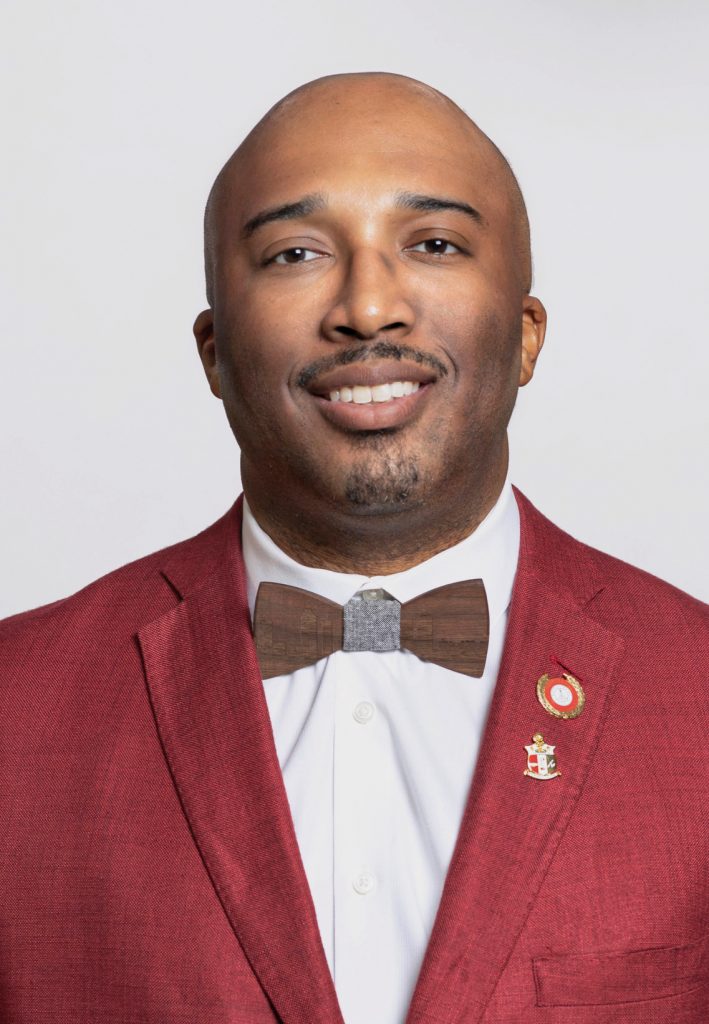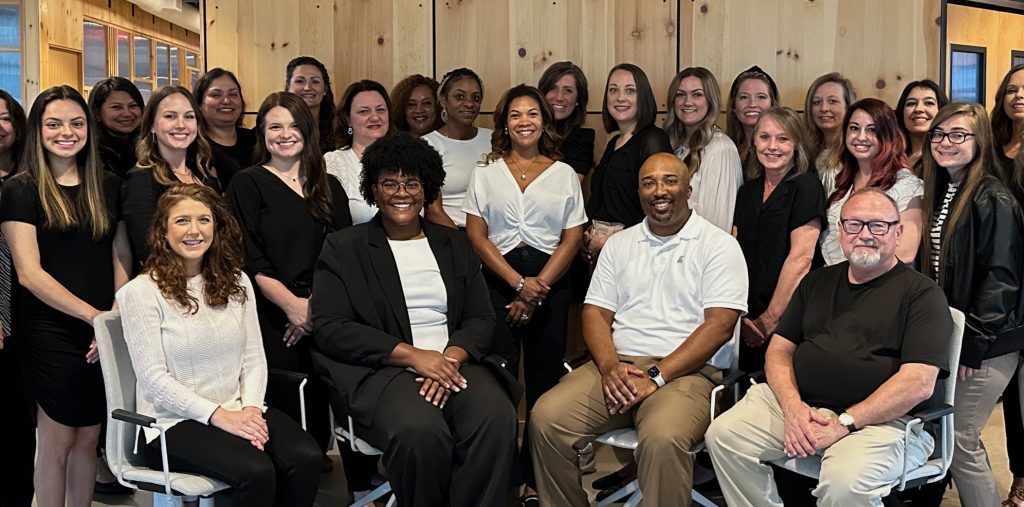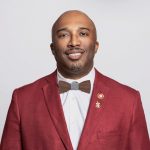Alumni Profile: Dr. Jordan Brunson (DDS 2006) — People skills, a culture of teamwork and a love of all things dentistry guide a still-growing dental practice12 min read
This profile is one in an ongoing series highlighting School of Dentistry alumni, donors and students.
Dr. Jordan Brunson is in a good spot in his dentistry career.
A man who knows what he likes and takes action to get there, Brunson owns a practice with three locations, soon to be four, in suburban Atlanta, Georgia. He and his three associates, along with a large team of employees, work to make each of their general practice offices a welcoming and lively spot for patients.

“I do enjoy what I call a high happiness index. I’m not an industrial psychologist, but in my mind that’s what I call it,” he says. “Our patients are kids, older adults, all ages, three or four generations. That gives vibrancy to the office. A lot of offices you walk into are quiet. But I like laughter, I like talking, I like the patient to feel like they went on a visit to a friend’s house.”
It’s an attitude he also projects for his team, since during the work week employees of any business spend more time with their colleagues than with family and friends. So the team members at Brunson’s practice have social hours after work, go on outings to Atlanta Braves baseball games, go bowling or join together in other activities broadly labeled as the Culture Club. “It’s about spending time together outside of dentistry so that we get to know each other and become stronger team members for each other,” he says.
His practice has come a long way since he bought his first office in Palmetto, Georgia, in 2011 and became a solo practitioner. He was coming off two years as an associate at another practice in Georgia and had already decided he would do things differently if he ever had a practice.
“I feel what’s most gratifying for me is that I want the team of people I work with to feel satisfied with what they do for a living, but also with their work culture. That’s what makes me happiest. I didn’t particularly enjoy the culture where I was an associate. Sometimes you go through something where you say, well, when I have a chance to do that, I’m going to do it differently. That’s one of the things that motivates me.”
That work philosophy worked. His Palmetto Family Dental practice thrived and in succeeding years he added associates, expanding to other south-suburban Atlanta locations in Zebulon and McDonough. This summer a fourth location will open in Fayetteville at Trilith Studios, a massive movie production complex that includes business, residential and park components. Brunson lives in Fayetteville, in the geographic center of his four practices, which makes it convenient as he makes the rounds.
Brunson’s journey into dentistry and to the University of Michigan School of Dentistry, where he graduated in 2006, is a story of people skills and mentors.
Growing up the son of an architect in Dallas, Texas, Brunson thought he might pursue a career in plastic surgery. His thinking changed after he attended a summer program at Morehouse College in Atlanta leading up to his freshman year there. Pre-health-profession students were introduced to a number of professionals, including a dentist, Dr. Bernee Dunson of Atlanta. “He spoke glowingly of the profession, the control you have, the amount of work you want to do or not. The ability to help people. The ability to change somebody’s life with your skill and art. I was really intrigued by that,” Brunson recalls.

Brunson refocused on dentistry while at Morehouse, realizing that with dentistry he could use his people skills to a much more rewarding degree than with plastic surgery. With dentistry, he could get to know patients over a long period of time. As a plastic surgeon, it would usually be completing one procedure and then he would be done with the patient. Dunson, who still practices in Atlanta and served as president of American Academy of Implant Dentistry in 2020, became a mentor for Brunson during his time at Morehouse and still today.
Summer programs were an important part of Brunson’s college experience, and two of those were at the University of Michigan. The Pipeline program and the Profile for Success (PFS) program aim to increase the number of historically underrepresented minorities seeking to join dentistry by exposing them to the various aspects of dentistry. For Brunson, meeting and talking with faculty during his six weeks at the School of Dentistry made a big impression. “I got to meet all these people who are world renown in their profession. And they are talking to me and I’m not even in dental school yet,” he recalls. “I would just walk the halls and knock on doors and go in and talk to people. To the point that when it was time for dental school admission interviews, they had to search for someone who didn’t know me because I had talked to so many people.”
With offers from dental schools around the country, Brunson said Michigan seemed like the best fit and it turned out he was right. Morehouse had prepared him well for the didactic work and a few early struggles with his handwork in preclinic classes were remediated by faculty. He remembers that Dr. Gisele Neiva, who is still on the faculty today, was particularly helpful. Older students were also supportive when he needed help. Brunson recalls staying true to a study regimen of every night except Friday night, then taking Saturday off before returning to study mode all day Sunday. Also important to his success was meeting faculty member Dr. Todd Ester, the current Assistant Dean for Diversity, Equity and Inclusion, who became a lifelong mentor.

When Brunson graduated in 2006, he served three years in the U.S. Army as part of a scholarship program. Assigned to Fort Moore in Georgia, he quickly learned the value of attending the University of Michigan School of Dentistry. “Usually, when you first go into the military, somebody watches you do dentistry for a little bit. You are under somebody’s supervision. I showed up there and I walked in and I saw the commander. He asked where I went to dental school. I said Michigan and he signed off that I could work on my own, based on the reputation of the school.”
After his three-year military commitment ended, Brunson decided to stay in Georgia as an associate for two years at the dental practice where he learned what he did and didn’t like in an office culture. Since buying the practice in Palmetto and implementing his vision, it has steadily blossomed into his network of three associates and four offices.
Success has a way of making people reflect on where they’ve been and who and what contributed along the way. For Brunson, the U-M School of Dentistry is a central element. Over the last few years, he has supported the school with financial gifts as a way to help current students find future success.
Brunson is grateful for all aspects of his dental education at one of the top dental schools in the world, but he believes one of the school’s most important contributions to dentistry and dental education has been its longstanding commitment to diversity, equity and inclusion. As a Black man in a profession where Black men remain significantly underrepresented, Brunson draws a correlation between diversity and excellence.
“When you look at the strongest schools, the highest ranked schools, the schools that are world renowned, the schools that do the most and best research, they are diverse schools like the University of Michigan. With that diversity, you get different ideas, different viewpoints, different world viewpoints, different thought processes, different ways of attacking a problem.
“The schools and businesses that are more diverse are the ones that are going to thrive, the ones that are going to survive, the ones to be first to adapt to new technologies, the first that are going to be at the cutting edge of certain treatments. The others are just going to be followers. At the end of the day, embracing DEI is showing that you are a leader. Are you going to be a leader or a follower?”
One of the most important ways to maintain and improve diversity is impressing young people about dentistry as a great career, just as Brunson’s mentor did at the summer program before his freshman year of college. Brunson believes it’s important to reach out at an earlier age today than has been the tradition historically. “I think if I was writing a grant for a recruitment program for dentistry, I would want to start that love of dentistry, or for any of the health sciences, early in high school. It’s so easy now for young people to choose other paths because maybe they worry about eight years of study in college and dental school. You have to give them a love for dentistry and show them the options of how to get there.”

Part of that equation is the cost of a dental education, which is why Brunson has for several years contributed financially to the dental school’s Lee Jones Endowment for Dentistry Diversity, which supports programs designed to increase dental school admissions of prospective students from diverse backgrounds. The late Dr. Jones was the first Black dentist to practice in Ann Arbor after he graduated from the dental school in 1961. While still maintaining his practice, Jones returned to the dental school after several years to become an instructor and, in 1973, was named director of what was then called the Office of Minority Affairs. Under his leadership over the next 20-plus years, the school developed programs that increased minority enrollment and established the school as a leader in increasing diversity in dentistry. It was the forerunner of what today is the dental school’s Office of Diversity, Equity and Inclusion under the direction of Dr. Todd Ester, Assistant Dean for DEI. There is also a student scholarship fund named for Jones.
Last spring, Brunson learned that the dental school’s Student National Dental Association chapter needed financial help for its annual graduation banquet, so he wrote a check to cover their expenses. “This year I gave to help them out because they need to have that banquet,” he said, “but in the future I look to find solutions for endowing that.”
Brunson said each alumnus of the dental school needs to make their own decisions about whether to give back to the school financially and how much. However, he has developed a strong belief in what he calls “cutting a crown for U-M.” He explains his reasoning this way: “Your financial giving to the school should be, at a minimum, the cost of a crown in your office. If you are giving, if you look at it, unless you just got out of dental school, you can afford to give the equivalent of a crown.”
Moving forward, Brunson remains excited about his place in the profession. Overseeing four offices while practicing dentistry adds complexity to his career, but he says he has always liked being busy. He continues to expand his education and expertise into more aspects of dentistry. On a recent morning, as he waited to be interviewed for this story, he was researching intraoral cameras, scheduling employee reviews and checking sleep apnea literature. Regarding the latter, he offers that if occlusion was dentistry’s conundrum of the 20th century, sleep apnea will be dentistry’s conundrum in the 21st century. It’s yet another part of dentistry that keeps him challenged.
“I’m always trying to stay busy with my mind,” he said. “There’s always something going on, but I like existing in the chaos. That gumbo makes me happy, for lack of a better term.”
###
The University of Michigan School of Dentistry is one of the nation’s leading dental schools engaged in oral healthcare education, research, patient care and community service. General dental care clinics and specialty clinics providing advanced treatment enable the school to offer dental services and programs to patients throughout Michigan. Classroom and clinic instruction prepare future dentists, dental specialists and dental hygienists for practice in private offices, hospitals, academia and public agencies. Research seeks to discover and apply new knowledge that can help patients worldwide. For more information about the School of Dentistry, visit us on the Web at: www.dent.umich.edu. Contact: Lynn Monson, associate director of communications, at [email protected], or (734) 615-1971.

